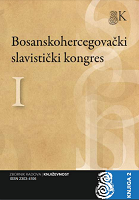Хуманизмот во поетиките на Иво Андриќ и Блаже Конески
This article presents a comparative analysis on the poetics od Ivo Andic and Blaze Koneski, from the aspect of moral philosophy coprehension and its portion of presence. The analysis covers the segments of the Andric and Koneski’s stands and attitude on the issues of the decadentism in the art, their stands on the matter of the tradition, on the violence, etc. Also, this research analyses the style expressions on bouth authors. Especially, their interests and engagments for the human values and principals are accentted. The path of comparison moves in direction of the Balkan altruistic incoherence, the problem of the human relations and world parttiality that implicates the alienation and the loneliness. And finally, the problem of the rational behaviour of their literature heroes is accented as a basic of their humanism.
More...
